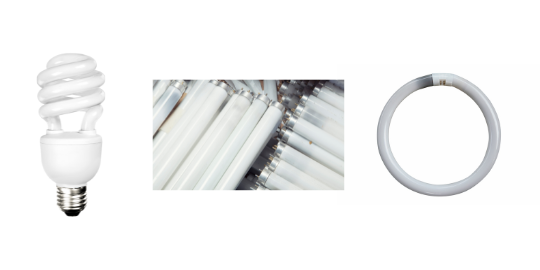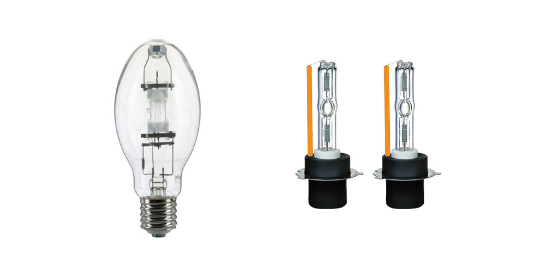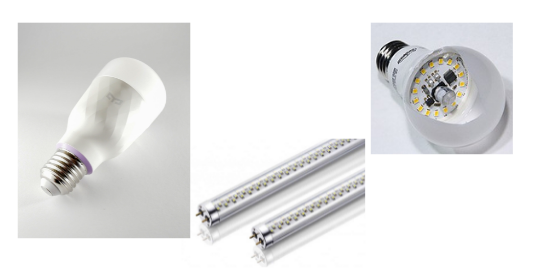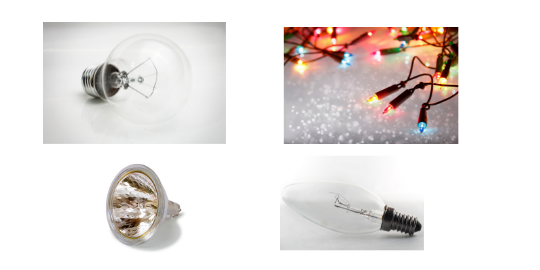Light Bulbs
How any given light bulb or tube should be safely disposed of or recycled depends on its type. This can be difficult to understand because bulbs of different kinds can look similar. This page goes through each bulb type and explains the safest, most environmentally friendly means of disposal. They are listed in order of most problematic in the waste stream to least problematic.
Fluorescent Bulbs and Tubes
Fluorescent lights come in two different forms; Compact Fluorescent Lights (CFLs) that fit into normal household lamps and light fixtures, and tubes that are used in commercial settings, and sometimes in household basements, closets and garages. Linear fluorescent tubes vary in length from 2' - 12'. They are also sometimes non-linear, in circular or U-shapes. CFLs in particular have been promoted for their energy efficiency - they last 10 times longer, and use 75% less electricity than traditional incandescent light bulbs. The problem is that they contain mercury - an acute neurotoxin - that can leach from landfills into water. Please do not dispose of CFLs or fluorescent tubes in your household trash or recycling bins. Instead, use one of the recycling options listed here.

Fluorescent bulbs contain small amounts of mercury and should be handled carefully.
HID Bulbs and Lamps
HID stands for "high intensity discharge." These very bright lights are mostly used in industrial applications, though they are sometimes also used in floodlights and in car headlamps. Like fluorescent bulbs and CFLs, they often contain mercury and/or small amounts of radioactive material. These are hazardous in landfills, so please do not dispose of HID bulbs in your household trash or recycling bins. Instead, use one of the recycling options listed here.

HID bulbs can contain both mercury and radioactive materials.
LED Bulbs and Tubes
LED stands for "light emitting diode." A LED bulb uses a computer chip to direct light of one color in a single direction. They come in many shapes and sizes, including tubes (which are really just multiple small LED bulbs arranged in a long case). From an environmental standpoint, LED bulbs are very efficient and durable, and their components are relatively safe compared to CFLs or fluorescent tubes.
LEDs contain components that are recyclable. Please take a look at the recycling options listed here, and note that Kane County Recycling Centers will accept LED light strings (e.g. Christmas or other decorative light strings) but cannot take loose bulbs or tubes.

The electronic components of LED bulbs are recyclable.
Incandescent and Halogen Bulbs
These two types of bulbs are very similar - the bulb part of a halogen lamp is filled with a halogen gas and the filament is made of tungsten metal, giving it different chemistry and a longer life compared to regular incandescent bulbs. Halogen bulbs are often used in outdoor lighting. Both halogen and regular incandescent bulbs are very energy-inefficient compared to LEDs and CFLs, so many households are phasing them out of use. While these bulbs cannot be recycled,
they do not contain toxic materials and should be disposed of in household trash, preferably inside a container to prevent breakage. Please do not put them in your recycling bin. Note that Kane County Recycling Centers will accept incandescent light strings (e.g. Christmas or other decorative light strings) but cannot take loose bulbs.

Incandescent lights come in many sizes, shapes and colors. The bottom left image is a halogen bulb.
Light Bulb Recycling Locations
Friendly reminder: Kane County residents can use
Recycle Coach as a one-stop-shop to answer questions and find locations for all types of recyclable items.
Geneva Ace Hardware (617 W. State St., Geneva, 630-208-6600)
Kane County's collection partner, Ace Hardware in Geneva, accepts fluorescent tubes, CFLs, HIDs and LED bulbs at no cost to Kane County residents. The program is for household bulbs, not for business use. The County funds safe disposal and recycling of the bulbs and tubes collected. *Please bring all bulbs and tubes loose. Do not repackage, and do not tape or otherwise bind fluorescent tubes together. Doing so increases the likelihood of the tubes being broken during processing. Do not bring incandescent or halogen bulbs.*
Kane Co. Household Hazardous Waste Home Collection Program will pick up fluorescent tubes, ballasts from fluorescent tubes (just the ballast; not the whole fixture), CFLs and HID bulbs at no fee to Kane County residents in eligible areas.
See the program page for information about area eligibility, other accepted materials and scheduling.
Naperville - Hazardous Waste Facility accepts unbroken fluorescent tubes and CFLs. Open to all state residents. Read more about
Naperville Hazardous Waste Drop-off.
Lowe's - St. Charles (955 S Randall Rd. 630-338-4000) Drop off bin for CFL bulbs.
Home Depot - Algonquin (200 S. Randall Rd. 847-854-1100) Drop off bin for CFL bulbs.
Home Depot - Aurora (1250 N. Orchard Rd. 630-907-1480) Drop off bin for CFL bulbs.
Home Depot - Carpentersville (251 Springhill Rd. 847-783-0766) Drop off bin for CFL bulbs.
Home Depot - Elgin (995 N. Randall Rd. 847-622-9441) Drop off bin for CFL bulbs.
Home Depot - Geneva (2111 S. Randall Rd. 630-262-0380) Drop off bin for CFL bulbs.
Home Depot - Oswego (3080 Walter Payton Memorial Hwy. 630-554-7092) Drop off bin for CFL bulbs.
Home Depot - South Elgin (440 S. Randall Rd. 847-214-8718) Drop off bin for CFL bulbs.
Batteries + Bulbs - Elgin (352 S. Randall Rd. 847-289-8990) recycles fluorescent tubes, CFLs, HIDs and LED bulbs. There is a per item fee; call for details.
Batteries + Bulbs - Geneva (1492-C S. Randall Rd. 630-313-5700) recycles fluorescent tubes, CFLs, HIDs and LED bulbs. There is a per item fee; call for details.
Business Quantities of Fluorescent Lighting
The drop-off and home pick-up programs described above are intended for use by residents, not businesses. Businesses are required by law to handle mercury containing lamps as Universal Waste under the federal Resource Conservation and Recovery Act (RCRA) and must contract for their proper disposal.
Local options offering business services for lamps include the following:
EverLights, Roselle, IL, 877-934-9873
TerraCycle Regulated Waste, Aurora, IL, 866-480-4501
Light Bulb Mail-in Programs
The companies listed bellow sell return postage paid boxes that can be shipped to recycle light bulbs of various size and type.
ERI sells postage paid recycling boxes for fluorescent tubes, CFLs and HIDs. https://eridirect.com/services/recycling-kits/
Waste Management (WM) has a LampTracker program for larger quantities of fluorescent tubes, CFLs and HIDs. https://www.wmlamptracker.com/v2/product_lamp.cfm
WM also has smaller postage paid boxes for residential quantities
https://www.thinkgreenfromhome.com/SafeConvenient.cfm
TerraCycle Regulated Waste has boxes in a number of configurations to take various bulb types, including fluorescent tubes, CFLs, HIDs and LEDs. https://tcrwusa.com/collections/easypak
Lamp Master has boxes in a number of configurations to take various bulb types, including fluorescent tubes, CFLs, HIDs and LEDs. https://lampmaster.com/